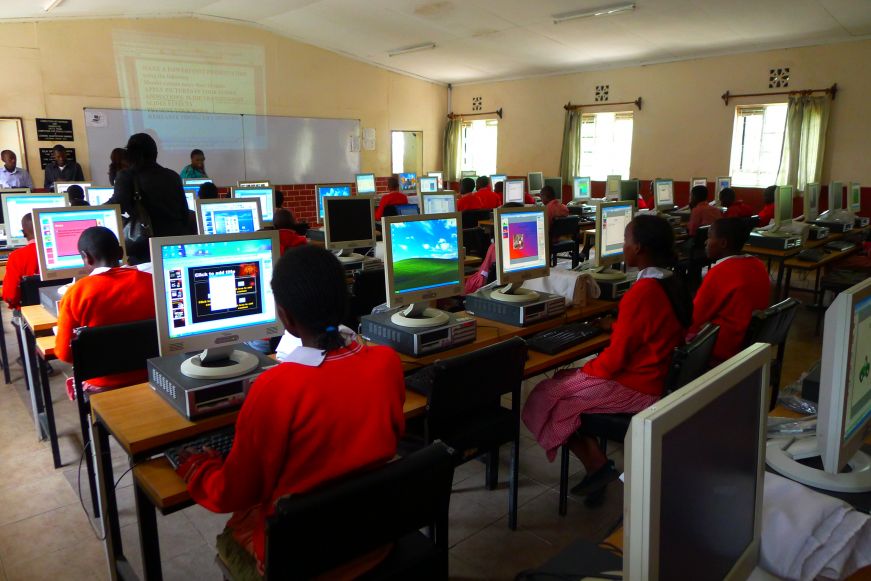Mafraq Enterprises LTD efforts in enhancing the facilitation and implementation of Digital Literacy as one of the main 7 Core-Competencies of CBC (Competence-Based Curriculum) in Junior Secondary School (JSS).

Mafraq Enterprises LTD efforts in enhancing the facilitation and implementation of Digital Literacy as one of the main 7 Core-Competencies of CBC (Competence-Based Curriculum).
In the current era, technology plays a vital role in our daily lives. It has become a necessity in all aspects of life, including education. Digital literacy is one of the core-competencies of the Competency-Based Curriculum (CBC) in Kenya. The Junior Secondary School level is the ideal stage to introduce students to digital literacy while embracing ICT.
Digital literacy involves the ability to find, evaluate, use, and communicate information using digital technology. In Junior Secondary School, students should be introduced to basic digital skills such as keyboarding, navigating computer systems, and accessing the internet. They should also learn how to use digital tools such as word processors, spreadsheets, and presentation software.
Junior Secondary School, which encompasses grades 7 to 9 in the new Competency-Based Curriculum (CBC) in Kenya, places a strong emphasis on developing students' digital literacy skills as one of the core competencies. Digital literacy involves the ability to access, evaluate, and use information from digital sources, as well as the ability to use digital technologies to communicate, collaborate, and create.
In the Junior Secondary School, digital literacy is integrated into several subjects such as Mathematics, Science, Social Studies, and Languages. For instance, students learn how to use digital tools such as spreadsheets and graphing software in Mathematics to visualize data and make calculations. In Science, students learn how to use online resources to research topics and conduct experiments. Similarly, in Social Studies, students learn how to use digital tools to analyze and interpret data from different sources.
Moreover, digital literacy is also taught as a standalone subject, where students learn how to use digital tools to create content, collaborate with others, and stay safe online. Students learn about online etiquette, online security, and privacy concerns. They also learn how to use social media responsibly, how to identify fake news, and how to protect themselves from online predators.
In addition, Junior Secondary School students are exposed to various digital technologies such as laptops, tablets, and smartphones. They learn how to use these technologies for communication, research, and creative purposes. Teachers also encourage students to use digital technologies to showcase their understanding of different topics through multimedia projects, presentations, and blogs.
Incorporating ICT in the Junior Secondary School curriculum can enhance the teaching and learning process. Teachers can use digital tools such as multimedia presentations, videos, and interactive games to explain complex concepts in various subjects. This can make learning more interesting and engaging for students, which can lead to better understanding and retention of information.
Furthermore, digital literacy can also help students develop important life skills such as critical thinking, problem-solving, and communication. For example, students can learn how to use digital resources to research and analyze information, which can help them develop critical thinking skills. They can also use digital tools such as social media and email to communicate and collaborate with their peers, which can help them develop teamwork and communication skills.
To ensure that students are competent in digital literacy, Junior Secondary School teachers should be adequately trained in ICT and digital literacy. This will enable them to effectively teach digital skills to their students and incorporate digital tools in their teaching. Additionally, schools should provide access to digital resources such as computers, tablets, and the internet to enable students to practice their digital skills.
Digital literacy is a crucial core-competency of the CBC. The Junior Secondary School level is the perfect stage to introduce students to digital literacy while embracing ICT. By providing students with digital skills, they can develop important life skills, enhance their learning experience, and prepare for a technology-driven future.
In conclusion, digital literacy is a crucial core competency in the Junior Secondary School, and it is integrated into several subjects in the CBC. Through the integration of digital literacy, students are equipped with essential skills that will enable them to thrive in the digital age. Furthermore, the development of digital literacy skills will prepare students for the future job market, where digital skills are highly sought after.
Mafraq Enterprises LTD can offer a range of ICT products and services to boost digital literacy in the context of Competency-Based Curriculum (CBC) in various ways. CBC is a modern educational approach that emphasizes on practical skills and knowledge development rather than theoretical concepts. Therefore, Mafraq Enterprises can tailor their offerings to align with the CBC approach and provide the necessary support to both students and educators. Here are some ways in which Mafraq Enterprises LTD can offer ICT products and services to boost digital literacy in CBC:
- ICT Infrastructure and Devices: To enable digital learning, CBC requires the availability of appropriate ICT infrastructure and devices in schools. Mafraq Enterprises can provide these devices, such as laptops, tablets, and interactive whiteboards, as well as install the necessary ICT infrastructure in schools. This will allow students to access digital content, communicate with their teachers and peers, and complete online assessments.
- Technical Support: Mafraq Enterprises can offer technical support services to schools that use their ICT products and services. This can include regular maintenance of devices and infrastructure, troubleshooting technical issues, and providing backup support. This can ensure that the digital learning environment is always available and functional, thus maximizing the impact of ICT on learning outcomes.
In conclusion, Mafraq Enterprises LTD can offer a range of ICT products and services to boost digital literacy in CBC. By providing appropriate infrastructure, devices, and digital content, along with training and support for teachers, Mafraq Enterprises can help students develop the digital skills and competencies required for success in the 21st century.











